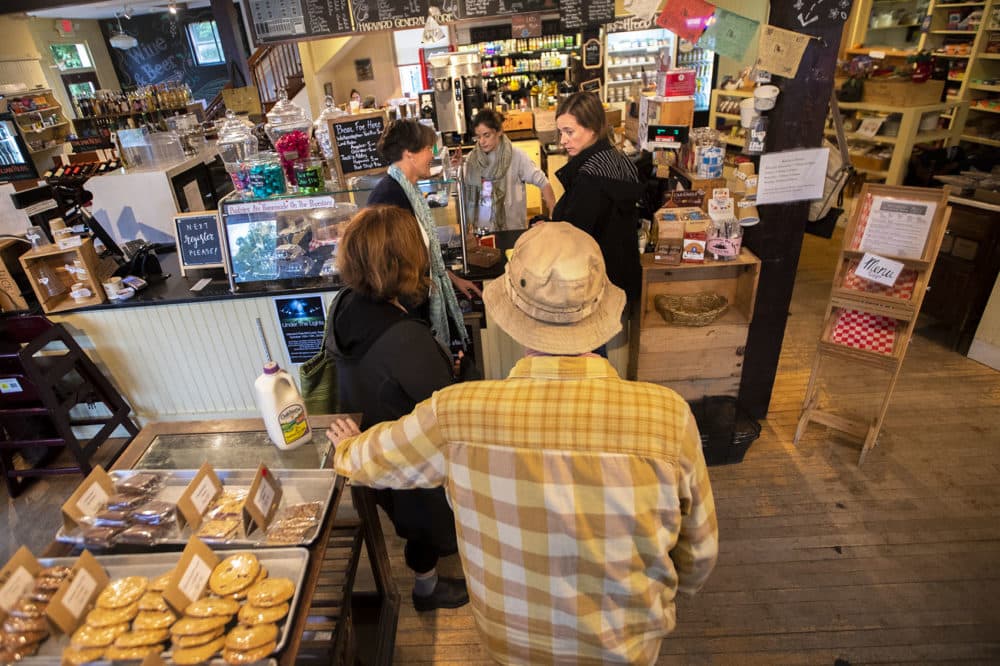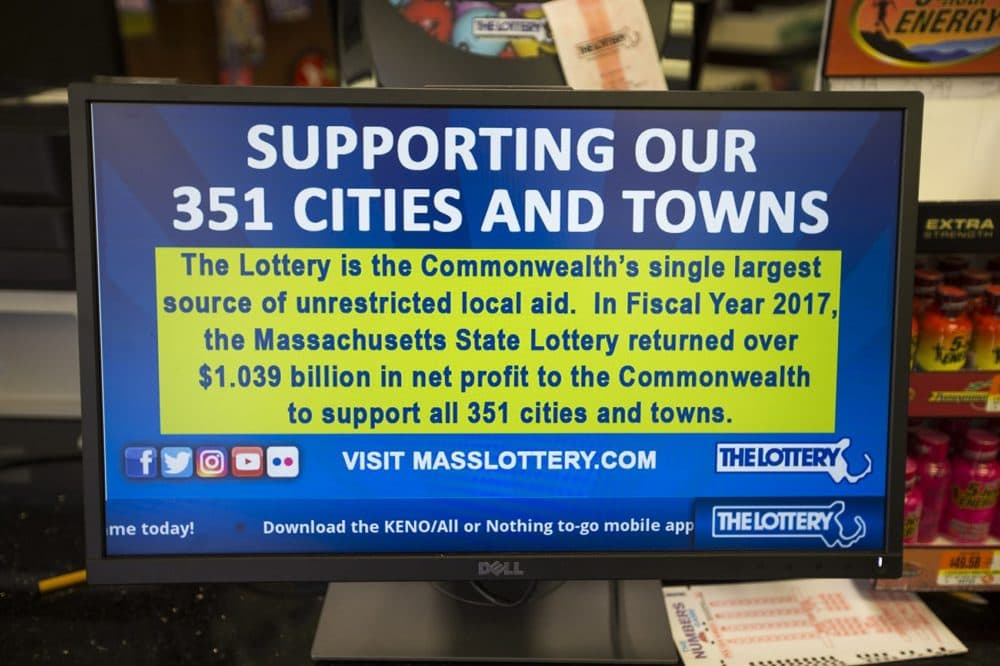Advertisement
The State's Lottery Distribution System Means Some Places Are Winners And Others Losers

The Massachusetts State Lottery is a major source of local aid for cities and towns, delivering hundreds of millions of dollars annually that communities use to improve public safety, schools and infrastructure.
But have a look at our interactive map on the state's distribution system of lottery funds to cities and towns, and you'll notice some places stand out. The system has critics that say it creates "winners" and "losers."
Nantucket, an island community that is well-known for its summer tourism and high home values, is the biggest "loser."
Over the past five years, retailers in Nantucket sold roughly $54 million in lottery products — the majority of which came from Keno games and scratch tickets. It received $355,000 in local aid from the lottery. That's a ratio of $152 in sales to $1 received -- the worst ratio by far of all Massachusetts municipalities.
The formula the state uses to distribute lottery funds was designed, decades ago, to give money to all towns and cities, with more funds intended to go to poorer, more populous places. It does this by giving priority to municipalities with greater populations and lower property values.
Nantucket has the opposite.
From 2013 to 2017, the average value for a single-family home was nearly $2.3 million, according to data from Nantucket's multiple listing service called LINK. The most recent Census data show that the island has roughly 10,700 residents. However, the population temporarily explodes there in the summer as vacationers flood into town.
Harvard is the big winner under this lottery system. The picturesque, small town does not sell lottery goods, but received a total of $6.6 million in lottery disbursements from 2013 to 2017. This was the highest figure of the 40 or so Massachusetts communities that also don't sell lotto products.
While residents in those 40 or so communities cannot buy lottery products in their hometowns, they can buy tickets in other towns and cities.
The Boston Globe reported last year that Harvard "receives credit for [the] population it had in the 1990s, when Fort Devens was an active duty military base," thus boosting its resident count in the lottery disbursement formula. A town official told the Globe that Harvard would fight any attempts to change the formula to give weight to a community's lottery sales.
And there have been attempts to change it, as the formula has long drawn criticism from lawmakers, advocates and residents who say it does not fairly distribute lottery net profits.
In July, a bill proposed by Seekonk state Rep. Steven Howitt, which would block towns and cities that do "not provide opportunity for sales" from getting a cut of lottery revenue, was ordered to study -- a form of legislative purgatory.
Nantucket resident Susan Lister Locke was unaware of the distribution system. When told about how Nantucket fares compared to Harvard in terms of lottery sales and distribution, Locke, who was walking about her Easy Street jewelry store, stopped and said, "Oh, that's not fair. That's not fair. Why is that?"
Locke said the state should rework the formula so "a good percentage" of Nantucket's lottery sales come back to the island. She added that as the formula weighs property values, it misses that although the island's home values are high, the incomes of many of its residents are not. The median household income there is about $89,000, according to Census data.
"We've got all sorts of people that don't live in the great big properties. We've got a lot of normal people," Locke said. "We have a whole support network of people that live here to support all of the tourist industry, and they are people of not great means, you know? And they need money, and they're the ones who are probably playing the lottery tickets. The people who own the estates are not buying lottery tickets."
Locke is not alone in thinking the formula unfairly impacts certain places on the Cape and Islands, many of which have among the highest sales to revenue ratios in the state.
"We have a whole support network of people that live here to support all of the tourist industry, and they are people of not great means. ... The people who own the estates are not buying lottery tickets."
Susan Lister Locke, a Nantucket jeweler
Seventy-two-year-old Cleon Turner, who was a state representative for the 1st Barnstable District in Brewster from 2004 to 2014, argued vehemently — but unsuccessfully -- for a revamp of the formula in a 2010 budget debate. He felt the state should offer communities a minimum percentage of what they contribute to lottery revenue, and he said in an interview that the formula should "take into consideration where the lottery money comes from."
Turner and other critics have long used Harvard as an example of unequal distribution. He said that compared to many towns on the Cape, Harvard — with a median household income of $131,000 — is "a fairly ritzy town."
"And they generated how much [in lottery sales]? Zero," he said. "So there lies the inequity, in my opinion."
Turner's also says the state's lottery distribution formula does not factor in how incomes for people who live on the Cape and Islands have not risen proportionally with the value of homes there.
"Retired people on the Cape are predominantly blue-collar retired people with fixed retirement incomes," he said. "So their retirement incomes don't increase much, if at all. Yet, the property values keep increasing. So the state looks at the property values [through the lottery formula] and doesn't compare them to the incomes as much as they probably should."
He added: "And the unfortunate part — and I saw this every year for the 10 years I was in the Legislature — and I even specifically went up to other legislators and asked them, 'Do you think everybody on the Cape is rich?' And they essentially said, 'Yes.' "
Terry Sackett, who owns a home on Nantucket but lives outside of Washington, D.C., most of the year, said because the lottery is a statewide program she doesn't have a problem with places like Harvard getting a share of lottery net profits. Still, she echoed concerns that Nantucket may be getting less than its due.
"I know that Nantucket has a big problem with affordable housing, and they are starting to have more and more, you know, lower-income people who try to survive here," she said. "If they're selling that many lottery tickets, then that money needs to come back here in some form or another. I think the stigma is that Nantucket doesn't need it because it's Nantucket, but it really does need it."
Peter Clarke, who has lived in Harvard for a year, said that the town's history and reputation for rural quaintness attracts wealthy residents. He said he thinks "it makes sense" that towns that don't sell the lottery should not get a cut of the lottery funds.
"Why should they? And they don't-- I don't know if they really need it," he said. "... "It's probably people who are having a tough time economically [who] are choosing to spend that money because they want a better life. I mean, maybe some of it's gambling addiction. I don't know. But in general, I think that's why people play, and I would imagine those towns need more help than this one."

Some people, however, believe the formula works to address inequities.
Bo Zhao, senior economist at the Federal Reserve Bank of Boston, agreed that the state intended for the lottery formula to address inequities. He explained that the formula was designed to give "general purpose" funds to all municipalities on what he calls an "equalizing basis."
"It wasn't distributed based on the origin of lottery sales because that's not the goal of this aid program," Zhao said in a phone interview. "The lottery aid formula itself is equalizing, as the purpose stated. It allocates and will aid per capita to administer polities with lower property values per capita. So, in that sense, it does equalizing work."
But WBUR's analysis found some of the communities that fared worst on the sales to revenue ratio, like Provincetown and Tisbury, also had among the lowest median household incomes in the state.
Noah Berger, president of the left-leaning Massachusetts Budget and Policy Center, said the formula "distributes more aid to communities that have lower property values, and therefore, those folks usually have lower incomes."
But overall, Berger said the lottery "is a very regressive way of raising revenue."
"Lower income people spend a lot more in the lottery than middle and higher income people," he said. "So, if that's [the state's] primary way of raising revenue from the state, the state is raising revenue disproportionately from lower-income folks."
He said that despite the formula's attempt to give lottery profits to poorer communities where "it's harder to raise money locally," the formula and the lottery as a source of revenue push against each other in an attempt to address inequity. And, in his opinion, the "negative effects of how you raise money through the lottery tend overall to outweigh the positive effects of how it's distributed."
Many Massachusetts residents try their luck in the lottery. The state has the highest average amount of spending per resident in the country.
In the last fiscal year, the lottery returned nearly $1 billion to the towns and cities of Massachusetts.
Weston, the state's wealthiest community, received $140 per resident from 2013 to 2017 — a figure that was four times higher than what Nantucket received per resident during those years.
Lisa Creamer is a digital editor for WBUR. Jeff Kelly Lowenstein contributed reporting and data analysis. Lowenstein is an investigative journalist who teaches at Grand Valley State University. He is the project coordinator for the Gaming the Lottery project, an international collaboration involving student and professional journalists from Africa, Europe, Latin America and the United States.